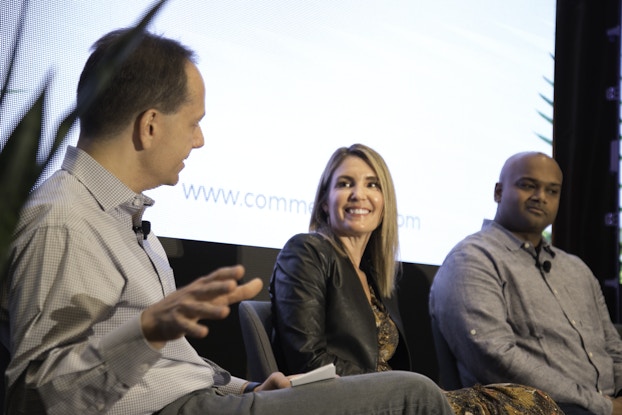
Customer loyalty — should you buy it, with discounts and coupons, or earn it, with experiences that make someone fall in love with your brand?
Most brands do both, but earned loyalty always is more valuable in the long term, according to a panel of loyalty and marketing executives who spoke at the 2019 CommerceNext conference attended by CO—.
“No one has ever come up to me when they find out I work for Sephora and said ‘I got this amazing 20% off coupon,’” said Allegra Stanley Krishnan, vice president of loyalty for beauty retailer Sephora.
“But they will come up to me and say, ‘I had some points that I redeemed for a reward experience that allowed me to meet a brand founder that I really loved, or go to a brand spa and spend a day there, or get a face chart from one of my favorite makeup artists,’” she said.
“It’s that more experiential loyalty that we believe drives the greatest lifetime loyalty.”
Creating meaningful experiences for customers and working with vendor partners to offer those experiences is more work than handing out a 20% off coupon, “but at the end of the day, it’s definitely worth it,” she said.
Krishnan was one of the speakers on the “Unlocking the Secrets to Loyalty and Retention” panel at CommerceNext, a conference focused on the art and science of customer acquisition.
She was joined on the panel by Sunil Kaki, senior vice president of marketing at organic online grocer Thrive Market; Liesel Walsh, vice president, customer relations, loyalty, and insights at Party City; and Lewis Gersh, CEO of PebblePost, a marketing technology platform. The panel was moderated by Scott Ableman, senior vice president of marketing for the Americas at GTT, the cloud networking company.
It’s that more experiential loyalty that we believe drives the greatest lifetime loyalty.Allegra Stanley Krishnan, vice president of loyalty for Sephora
Retention
The panel of business experts at CommerceNext explained how customer loyalty is dependent on the relationship. Read more on ways to attract and retain your own customers.
A lot like love
Customer loyalty, the panelists said, is a lot like love. It can’t be hurried, and to get it there needs to be an emotional connection.
Love, Thrive Market’s Kaki said, is what he looks for when analyzing customer interactions with the company, or social media conversations about Thrive Market.
“We listen for the word “love” — not like, not convenient, not cheap. Those are all great, but it’s actually love that we listen for,” Kaki said, and the goal the company sets for itself. It is Kaki’s job to understand what prompts those expressions of love and to reinforce them.
Thrive Market is an online, membership-based grocer of organic, natural, sustainable and healthy foods that promises warehouse club discounts. “Picture Whole Foods and Costco had a baby online and that’s Thrive Market,” is how Kaki described it.
Customers pay an annual membership fee of $59.95. In return, Thrive promises to give them 25% to 50% off retail prices on its products. Customers can create shopping lists by diet or values, selecting categories like paleo or vegan or cruelty-free.
With a membership model, Kaki said, “renewal is the end prize. We want folks to love our service and renew year after year after year.”
The company found that people who purchase more are more likely to renew, so it often relied on discounts and incentives to drive purchases. Now, he said, it also is trying to move toward “engaging with the community,” and creating high-value customer interactions.
“It’s easy to do the promos, discounts, and all those things, but much harder to actually create experiences, tell the right stories,” Kaki said. “How you get value in the world of Amazon is the storytelling, the emotional connection.”
Consumers today “want a brand they’re inspired by. Nobody is inspired by a 20% off coupon,” said Lewis Gersh of PebblePost.
After the session, moderator Scott Ableman told CO— his biggest takeaway from the discussion was that connecting to people through experiences should be valued much more highly than reaching them via promotions or traditional discount offers.
“If all you’re selling is a commodity for a price, you’re going to run into Amazon at some point,” Ableman said. “If you are creating experiences that get people to engage with your brand, you’re getting synapses to fire that they can’t touch, and building up defenses against anybody else that is going to try to steal that customer on price.”
CO— aims to bring you inspiration from leading respected experts. However, before making any business decision, you should consult a professional who can advise you based on your individual situation.
CO—is committed to helping you start, run and grow your small business. Learn more about the benefits of small business membership in the U.S. Chamber of Commerce, here.

Interested in a small business membership?
Find out how the U.S. Chamber of Commerce can help your company grow and thrive in today's rapidly-evolving business environment. Connect with our team to learn how a small business membership can benefit your bottom line and help you achieve your goals.







